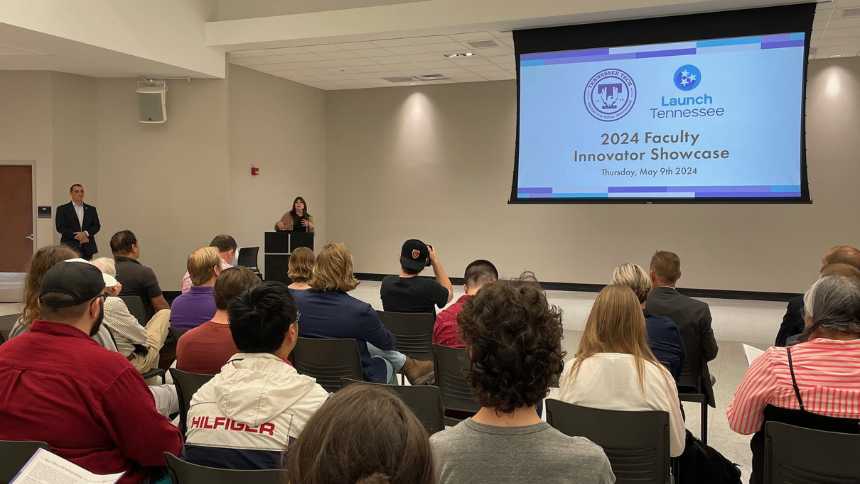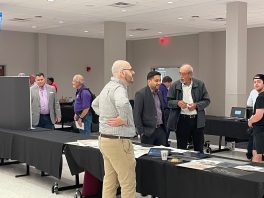
Nine Tennessee Tech faculty members present at inaugural “Faculty Innovator Showcase”
Their inventions ranged from one that has garnered more than $19 million in grant funding to another that was focused on providing a tricycle that could be ridden by blind kids and yet another that would put authentically digital tools in the hands of artists.
Nine faculty members at Tennessee Technological University in Cookeville presented their inventions during Thursday’s first-ever “Faculty Innovator Showcase” held in the Roaden University Center on campus.
 Hosted by TTU’s Center for Rural Innovation, the event drew about 50 people – faculty, staff, students, and community leaders. It started with a faculty trade show – think about a tabletop poster session (see photo at left) – followed by short presentations about their technologies.
Hosted by TTU’s Center for Rural Innovation, the event drew about 50 people – faculty, staff, students, and community leaders. It started with a faculty trade show – think about a tabletop poster session (see photo at left) – followed by short presentations about their technologies.
The inventions ranged from one that has garnered more than $19 million in grant funding plus a $500,000 investment from Breakthrough Energy Ventures to another that was focused on providing a tricycle that could be ridden by blind kids, another that would put authentically digital tools in the hands of artists, and the final presentation of the morning that was described as a way to fool Face ID systems.
“We see this as a transformation technology,” Dr. Rory Roberts said in describing the hybrid electric fuel cell propulsion system for which he has secured more than $19 million in grant funding. He explained that the system, which is capable of meeting national emission reduction goals, is less expensive to operate, more reliable than other options, and requires less maintenance.
For those who live in high-rise buildings, Dr. Tarik Elfouly described his invention which is a structural integrity prediction tool for apartment complexes that uses free sensing. The system, which is focused on structural degradation due to issues like weak foundations and faulty construction, uses a smartphone to collect data.
Dr. Charles Van Neste described something that he called Telluric Current Energy Harvesting that is particularly beneficial during natural weather events such as those that the Volunteer State experienced starting Wednesday and continuing into the morning hours of Thursday. He said he had demonstrated the system, which relies on pulsing current through the ground, at a small scale.
Finally, Perry Johnson described his concept for drawN that he said “responds more like an organism than a tool.” It would support artists who need a platform that “is extensible by design and physically engaging.”
Other presenters and their ideas were:
- Dr. Steve Canfield – Tek Engineering for blind kids;
- Dr. Ali Alouani – Driverless Systems Using Virtual Roads;
- Dr. Rail Gurusinghe – An L-Shaped Microwave Spectrometer for Advanced Molecular Analysis;
- Dr. Michael Nattrass – Decentralized Application for Zero-knowledge Proof Execution of Cloud-based Smart Contracts; and
- Dr. Bruce Jo – 2D Face Image Rendering to 3D and Printing to Hack Face ID Biometric Security.
Like what you've read?
Forward to a friend!

